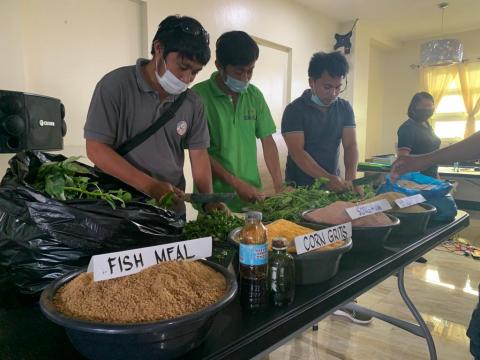Participants prepare the raw ingredients for the feed formulation using the locally available materials
Tagbilaran City, Bohol – Republic Act 10068, also known as the Organic Agriculture Act, outlines the policy to promote, propagate, develop further and supplement the practice of organic agriculture in the Philippines. Furthermore, agricultural extension workers have some common roles which include bringing in new technologies, and linking farmers/producers with research-based information to improve agricultural production, productivity, processing, and marketing of agricultural goods and services.
In order for the extension workers, especially the new generation, to have a unified understanding on how the organic agriculture activities shall be, it is imperative that the lead implementers/focal persons should be acquainted and briefed on the organic agriculture production technologies and related subjects. Hence, on April 18 – 22, 2022, a Gender-Based Training on Organic Agriculture Production Technologies was conducted at the B&J Guesthouse, Dampas District, Tagbilaran City, Bohol. This regionwide training was participated by twenty-one (21) participants coming from the provinces of Bohol (with 11 participants), Cebu (with 3 participants), Negros Oriental (with 4 participants) and Siquijor (with 3 participants).
This training aims to enhance the knowledge and skills of the participants on organic agriculture production technologies and its related topics.
During the three-day training, participants learned about the importance of organic agriculture as a sustainable farming system; legal basis and the IRR of the Organic Agriculture Act, certification standards and other principles and components; how to demonstrate skills in various organic agriculture practices such as Bokashi composting, Jadam organic farming, customized feed formulation using locally available ingredients, and integrated diversified organic farming system; and appropriate production technology for specific farm activities and management.
Moreover, the training looked into the gender aspect where all female and male AEWs were given fair opportunity to join the training: with13 females and 8 males completers. The importance of understanding gender awareness and gender perspective for agriculture and rural development is imperative for agricultural extension workers. Their awareness of the differences in roles and decision-making power between men and women in agriculture plays a great role in increasing rural agricultural production that helps reduce poverty and stimulate economic growth.
“For me, organic agriculture takes patience and an open mind. It helps in keeping agricultural production at a sustainable level. It reduces the cost of agricultural production and also improves soil health, ensures optimum utilization of natural resources for the short-term benefit and helps in conserving them for the future generation,” said Eveth Y. Yrauda of LGU Oslob, Cebu – one of the training participants.
Merigine C. Otara and Ma. Gracia Soliva-Pungay from ATI RTC -7; Dionisio Limbaga Palingcod Jr. from Palingcod Agricultural Farm, Batuan, Bohol; Mae Montecillo from Department of Agriculture Regional Field Office 7; Marjoe Rey A. Labonite from Office of the Provincial Agriculture, Tagbilaran City, Bohol; and Roland V. Villegas from Department of Education Region VII / Sudlon, Lahug, Cebu City have shared their expertise on the topics discussed as resource persons while Maryjane Flor Patulilic-Bonilla served as member of the training management team.
Should there be any clarifications or inquiries around this training, you may contact Ma. Gracia Soliva-Pungay, Project Officer, through her email at mgspungay@ati.da.gov.ph.

